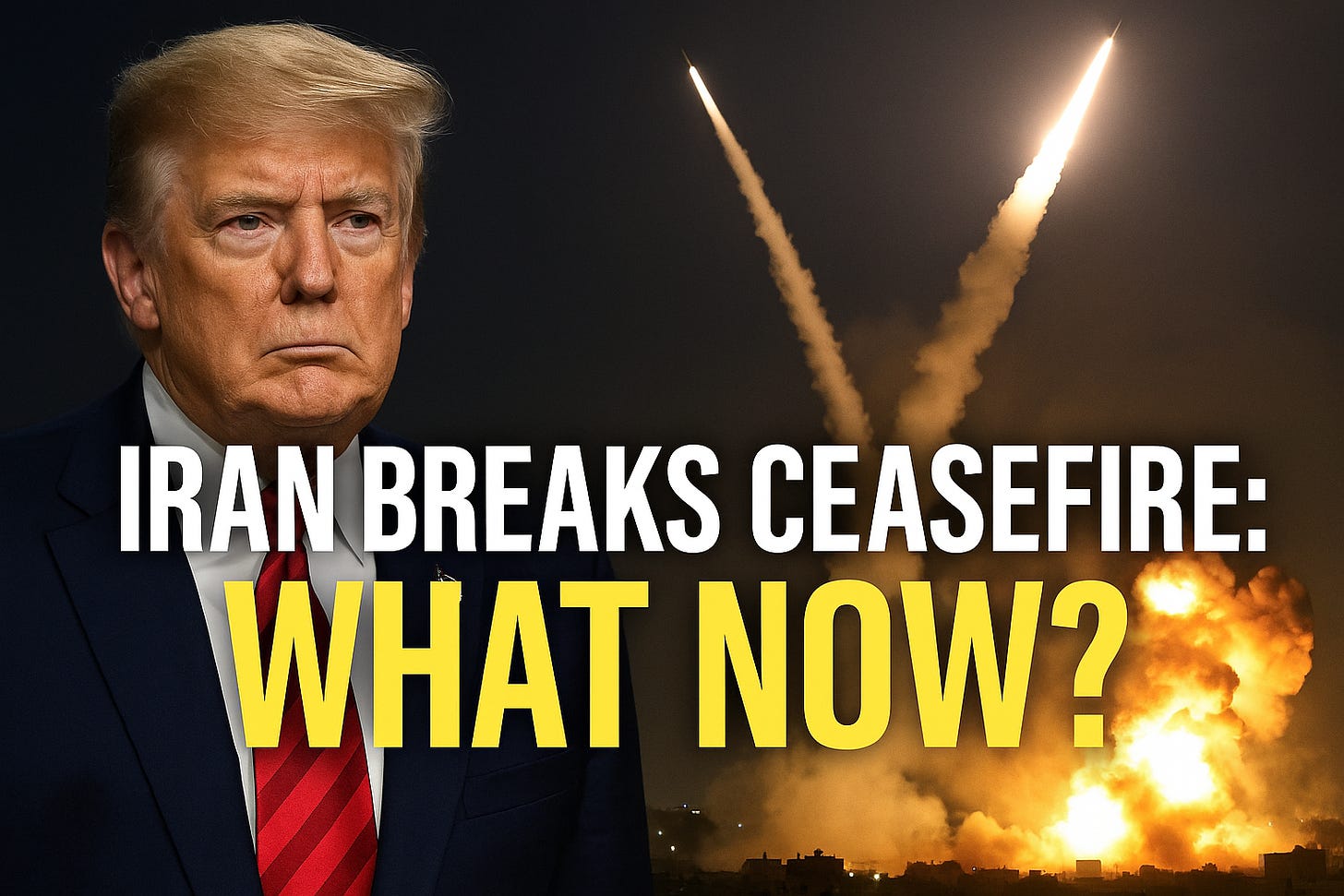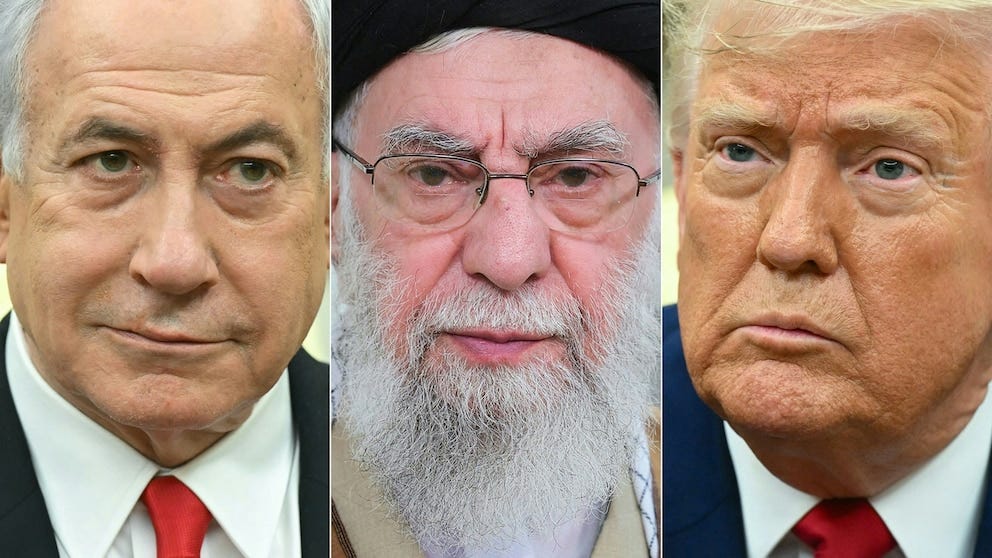Iran Breaks Ceasefire—Now What? Trump Tried Diplomacy, But Tehran Chose Missiles
When President Donald J. Trump announced on June 23, 2025, that a ceasefire had been reached between Israel and Iran after nearly two weeks of escalating hostilities, the world held its breath.
Just 12 hours later, missiles began raining down on Israeli cities.
Three people are dead. Eight more are injured. Sirens blared across Jerusalem and Tel Aviv. And the so-called ceasefire has exploded—quite literally—into a chaotic blame game.
While the mainstream media runs damage control and confused headlines, the American people are left asking a simple, urgent question:
Did Iran agree to peace—only to break it? Or did Trump get played?
TRUMP’S CEASEFIRE DEAL: A Diplomatic Gamble
President Trump’s June 23 announcement was seen as a bold, high-stakes maneuver. He claimed both Iran and Israel had agreed to “halt hostilities effective immediately” and praised the success of behind-the-scenes U.S. mediation efforts.
It was a diplomatic move that checked all the boxes critics demanded:
No boots on the ground.
No airstrikes by the U.S.
Averted war, preserved stability.
Trump showed restraint. He gave diplomacy a chance. He listened to the left, who long accused him of warmongering and demanded more diplomacy.
But almost instantly, the narrative unraveled.
“THERE WAS NO AGREEMENT,” SAYS IRAN
Iran’s Foreign Minister Abbas Araghchi posted on X shortly after the first reports of Israeli casualties:
“There was NO formal ceasefire agreement. We stated that IF Israeli aggression ceased by 4:00 a.m. Tehran time, we would stop firing. That did not happen.”
Meanwhile, Iranian state media contradicted him—again—reporting that the ceasefire had begun at 7:30 a.m. local time.
But Israeli reports show that sirens sounded well after that alleged start time, with emergency services responding to missile strikes in multiple cities.
So what is the truth?
Did Iran agree and then violate the ceasefire?
Or did Iran never actually agree, but allow Trump to believe they had?
Either way, the result is the same: Trump extended an olive branch, and Iran responded with warheads.
TIMING, TERROR, AND TALKING POINTS
Iranian media outlets have tried to muddy the waters by suggesting the missiles were launched before the ceasefire technically began—an argument that might fly at the U.N. but not in the court of public opinion.
In fact, Tehran’s narrative has changed so many times, it’s clear they’re not interested in clarity. They’re interested in chaos.
Let’s compare:
Trump announced a ceasefire on June 23.
Iranian state TV said it began June 24 at 7:30 a.m.
Iranian missiles reportedly struck after that time.
Israeli retaliation followed, further escalating tensions.
Whether it was a miscommunication, a deliberate ruse, or a breakdown in backchannel talks, Iran’s hands are not clean—and the dead in Israel prove it.
THE STRATEGIC CALCULATIONS: WHO BENEFITS FROM A BROKEN CEASEFIRE?
Iran’s goals here are clear:
Embolden their image in the region by claiming they stood up to Israel and the U.S.
Test Trump’s restraint in real time.
Drag America into a larger geopolitical confrontation—possibly coordinated with Russia and China.
Let’s not forget: Iran is not acting in a vacuum. Tehran has increasingly aligned itself with Moscow and Beijing over the past five years, especially after the 2022 breakdown in nuclear negotiations. A weakened U.S. or a war-fatigued Israel benefits both Russia and China in their global chess game.
And if Trump responds too harshly, they’ll blame him for starting World War III.
If he doesn’t respond strongly enough? He’ll be painted as weak.
That’s the trap. And Iran knows it.
Are We on the Brink of World War III?
We’re dangerously close. Not because of Trump—but because bad actors view American diplomacy as weakness, and they believe that a divided West won’t respond with force.
Let’s be very clear: Trump tried diplomacy. He gave the world a chance to avoid bloodshed. Iran threw it away.
Now, Trump’s hand has been forced. And the world is watching to see if the America First doctrine still has the spine to stand up to enemies who only understand one language: power.
The question is not whether Trump caused this.
The question is whether anyone else could have stopped it.
QUESTIONS THAT NEED TO BE ANSWERED — NOW
The fog of war is thick. But there are key questions President Trump and his national security team must address immediately:
Was there a formal ceasefire agreement in writing?
Did the U.S. receive confirmation from both Israel and Iran?
Were the terms relayed clearly, with timestamps?
Did Israel continue strikes past Iran’s “cutoff” deadline?
Was Iran always planning to attack, ceasefire or not?
Is there satellite or intelligence proof of when and where the Iranian missiles were launched?
Was this coordinated with Russia or China, and are we watching the formation of a new Axis of Power?
If the U.S. can’t even confirm a ceasefire it brokered, we have a serious credibility problem. If it can confirm the deal and has proof Iran broke it, the consequences must be swift and unavoidable.
TRUMP’S OPTIONS NOW
Trump has always governed by a doctrine of peace through strength—and now is the time to prove it still holds.
Here’s what the next 48 hours must look like:
Demand U.N. Security Council action—even if it gets vetoed. Put Iran, Russia, and China on record.
Provide clarity to the American people—was there or wasn’t there a deal? Transparency is crucial.
Reinforce U.S. allies in the region with defensive and strategic assets. Signal strength without escalating.
Target Iranian missile infrastructure with cyber or precision options—show there’s a price for deception.
End the ambiguity. Iran doesn’t get to rewrite facts after the missiles are already in the air.
THE BOTTOM LINE: PEACE ISN’T POSSIBLE WITH LIARS
Trump gave diplomacy a chance. That should’ve been celebrated across the aisle.
Instead, Iran took advantage of it. And now lives have been lost.
This isn’t just about the Middle East anymore. It’s about whether the United States can negotiate from a position of strength—or whether tyrannical regimes like Iran can dictate terms through lies and backpedaling.
The next move belongs to President Trump.
Let’s hope it’s the right one—because failure now could cost us more than credibility.
It could cost us peace.
Follow @MPThunderReport on X for real-time updates, analysis, and exclusive reporting. Support our work at ThunderReport.org.






